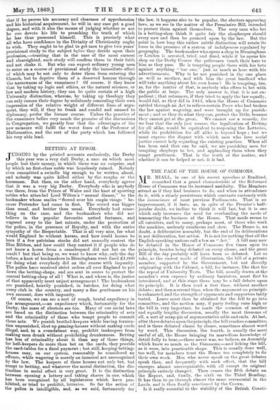BETTING AT EPSOM.
JUDGING by the printed accounts exclusively, the Derby this year was a very dull Derby, a race on which most people lost their money, in which there was no surprise, and by which no first-class noble was hopelessly ruined. Nobody even committed a swindle big enough to be written about, and nobody •was quite killed either by the roughs or the horsemen. But then, on the other hand, everybody agrees that it was a very big Derby. Everybody who is anybody was there, from the Prince of Wales and the knot of sporting nobles who attended Lord Wilton's " annual dinner," to the bookmaker whose smiles "flowed over his ample visage because Pretender had come in first. The crowd was bigger than usual, and bettier than usual. Everybody had something on the race, and the bookmakers who did not believe in the popular favourite netted fortunes, and wagered away to the last minute, under the protection of the police, in the presence of Royalty, and with the entire sympathy of the Respectable. That is all very nice, for what would England be without horses, and how could horses be born if a few patrician stocks did not annually contest the Blue Ribbon, and how could they contest it if people who do not know a horse from a cameleopard did not bet on the result ? but that being so, we want to know why, only the day before, a knot of bookmakers in Birmingham were fined £1,000 for doing what everybody did on the course with impunity. The police have received strict orders all over England to put down the betting-shops, and are sent in scores to protect the central betting-shop of all I What is, and where is, the justice of that apparently most unjust arrangement / The bookmakers are punished, heavily punished, in batches, for doing what every club in the country, and many a fine gentleman on his own account, does with impunity.
Of course, we can see a sort of rough, brutal expediency in the arrangement, —an expediency which, fortunately for the Derby, the mass of electors see too. Many of our social laws are based on the distinction between the criminality of acts and the criminality of those who tempt people to commit those acts. We punish brothel-keepers while leaving fornication unpunished, shut up gaming-houses without making cards illegal, and, in a roundabout way, prohibit innkeepers from making men drunk without prohibiting drunkenness. Betting has less of criminality about it than any of those things, for hell-keepers do more than bet on the cards, they provide the card-tables for a fixed payment ; but still, keeping bettinghouses may, on our system, reasonably be considered an offence, while wagering is merely an immoral act unrecognized by the law. The keepers of these houses not only bet, but tempt to betting, and whatever the moral distinction, the distinction in social effect is very great. It is the distinction between opening a lottery and taking shares in one, which has been recognized by all legislatures which have prohibited, or tried to prohibit, lotteries. So far the action of the police is intelligible, and, as we said, fortunately for the law, it happens also to be popular, the electors approving laws, as we see in the matter of the Permissive Bill, intended to protect them against themselves. The very men who bet in a betting-shop think it quite fair the shopkeeper should every now and then be pounced upon by the law. But the point is, how long this rather subtle distinction will retain its force in the presence of a system of indulgences regulated by geography. The book-maker who opens a shop in Birmingham . or London is arrested, tried, and fined, while if he opens his shop on the Derby Course the policemen touch their hats to him as they pass. Ho is tempting people there with his bets against anything " bar one," just as much as here with his advertisements. Why is he not punished in the one place as well as another, and with him the great landlord who will take anything about his own horse ? He is tempting, too, as, for the matter of that, is anybody who offers to bet with the public at large. Tho only answer is, that it is not expedient ; that reformers, if they tried to apply the law equally, would fail, as they did in 1844, when the House of Commons rattled through an Act to relieve certain Peers who had broken the law against wagering, and were brought up for punishment ; and so they do what they can, protect the little, because they cannot get at the great. We cannot see a remedy, for we fear that the only just course, the legalization of Betting for all alike, would be equivalent to reopening the Lotteries, while its prohibition for all alike is beyond hope ; but we must express the disgust with which men who love social justice cannot help regarding the existing practice. When all has been said that can be said, we are punishing men for tempting shopboya to bet, and applauding them when they tempt gentlemen. That is the truth of the matter, and whether it can be helped or not, it is bad.






























 Previous page
Previous page